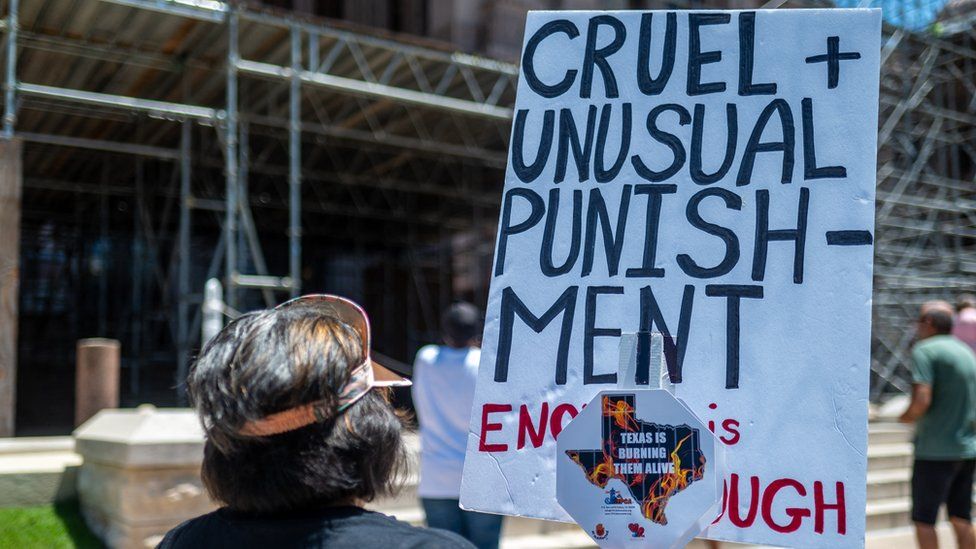As temperatures rise, prisoners locked in cells without air conditioning – and the staff guarding them – are struggling.
Calvin Johnson spent 37 years in a Texas state prison, including 37 summers in a jail cell with no air conditioning.
On the countless blisteringly hot days, when temperatures climbed above 37.7C (100F), his survival depended upon a mix of creativity and desperation to stay cool – stay alive.
“Sometimes you can clog the commode and let the water run,” Mr Johnson, 67, said. “Put your pants and your shirt across that, and lay in the water for a while.”
It’s something he did “a bunch of times”.
Though he never tried, Johnson said he even saw some inmates drinking water from the toilet because it was a few degrees cooler than what came from the cell’s sink.
While there were some means to cool off available in the prison where Johnson was incarcerated, he said they weren’t easy to access. Fans were few, he said, and ice was rare.
“People passed out from the heat,” Johnson said. “I’ve seen that many times.”
The year he was released from prison, in 2022, it was the third hottest summer on record in the US, according to the National Oceanic and Atmospheric Administration.
This week, over 230 million Americans will experience temperatures above 32.2 C (90F). The increasing frequency of dangerously hot conditions has drawn renewed attention to US prisons and calls for reform.
Thirteen states in the hottest parts of the US – including Texas and Arizona – lack universal air conditioning in prisons, according to an analysis by the Prison Policy Initiative, creating deadly conditions.
One study, published in Plos One, found that summertime mortality rates in US state and private prisons rose by 5.2% for every 10F increase in temperature above historical averages.
Of the 100 prisons operated by the Texas Department of Criminal Justice, 31 are fully air-conditioned and 55 have air-conditioning limited to certain areas. Fourteen have no cooling at all, like Wainwright prison where Johnson was incarcerated.
In November, researchers at Brown, Boston, and Harvard universities found that between 2001-2019, 13% of the deaths that occurred in Texas prisons without universal air conditioning “may be attributable to extreme heat days”.
Since mid-June, at least nine prisoners have died of reported heart attacks or cardiac events in uncooled Texas prisons where the outdoor heat indices were above 100 degrees, the Texas Tribune reported.
The newspaper said at least another 14 died of unknown causes on days of extreme heat, and that they were often found unresponsive in their cells by prison staff.
TDCJ spokesperson Amanda Hernandez said it was inaccurate to label any death as heat-related before an investigation is complete. According to the department’s official statistics, there have been no heat-related deaths since 2012.
There have been eight inmates who required medical care beyond first aid for heat-related injuries in 2023, Ms Hernandez said, but none were fatal.
In an emailed response, she told BBC the department takes its responsibility to protect inmates and staff seriously.
“Everyone has access to ice and water. Fans are strategically placed in facilities to move the air. Inmates have access to a fan and they can access air conditioned respite areas when needed,” she said.

Prison advocates say Texas’ tough-on-crime stance makes legislators reluctant to improve conditions.
This year, the Texas House made moves to address the Lone Star State’s overheated prisons.
It passed a bill that would require prisons to be kept between 18C-29C, already required in local jails, and budgeted over $343m to outfit the state’s prisons with air conditioning.
But the Senate rejected the bill and slashed the money allocated for improving conditions, despite Texas having a more than $32bn budget surplus during this year’s legislative session, BBC’s media partner CBS reported.
The BBC has reached out to the Texas Senate Committee on Finance for comment.
But according to Clifton Buchanan, a former Texas prison guard and current deputy director of AFSCME Texas Corrections – the state’s largest organisation representing TDCJ employees – it’s not just prisoners who are affected by the heat. Prison guards are suffering too.
“This is about the staff, the taxpayer, soccer mom, or dad who’s a football coach,” Mr Buchanan said.
“Everything inmates suffer from, we do as well.”
To describe what it’s like in a prison where triple-digit temperatures fill the air, he said: “It’s like working in an inferno.”
“You have to wear a stab-proof vest, walk up and down flights of stairs for several hours… Officers get lightheaded, they get dizzy, they get nauseous.”
“Does one of our staff have to die before they will put AC there?”
Related Topics
- Texas
- United States
